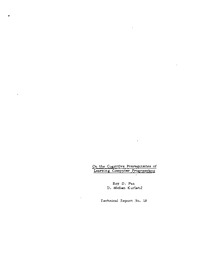On the Cognitive Prerequisites of Learning Computer ProgrammingTechnical Report No. 18
Publikationsdatum:
|
 |
 Diese Seite wurde seit 7 Jahren inhaltlich nicht mehr aktualisiert.
Unter Umständen ist sie nicht mehr aktuell.
Diese Seite wurde seit 7 Jahren inhaltlich nicht mehr aktualisiert.
Unter Umständen ist sie nicht mehr aktuell.
 Zusammenfassungen
Zusammenfassungen
 Training in computer literacy of some form, much of which will consist of training in computer programming, is likely to involve $3 billion of
the $14 billion to be spent on personal computers by 1986 (Harmon, 1983). Who will do the training? "hardware and software manufacturers, management consultants, -retailers, independent computer instruction centers, corporations' in-house training programs, public and private schools and universities, and a variety of consultants"
(-ibid. , p. 2 7 ) . To date, very little is known about what one needs to know in order to learn to program, and the ways in which educators might provide optimal learning conditions. The ultimate success of these vast training programs in programming - especially toward the goal of providing a basic computer programming competency
for all individuals - will depend to a great degree on an adequate understanding of the developmental psychology of programming skills, a field currently in its infancy. In the absence of such a theory, training will continue, guided - or to express it more aptly, misguided - by the tacit "folk theories" of programming development that until now have served as the underpinnings of programming
instruction. Our paper begins to explore the complex agenda of issues, promise, and problems that building a developmental science of programming entails.
Training in computer literacy of some form, much of which will consist of training in computer programming, is likely to involve $3 billion of
the $14 billion to be spent on personal computers by 1986 (Harmon, 1983). Who will do the training? "hardware and software manufacturers, management consultants, -retailers, independent computer instruction centers, corporations' in-house training programs, public and private schools and universities, and a variety of consultants"
(-ibid. , p. 2 7 ) . To date, very little is known about what one needs to know in order to learn to program, and the ways in which educators might provide optimal learning conditions. The ultimate success of these vast training programs in programming - especially toward the goal of providing a basic computer programming competency
for all individuals - will depend to a great degree on an adequate understanding of the developmental psychology of programming skills, a field currently in its infancy. In the absence of such a theory, training will continue, guided - or to express it more aptly, misguided - by the tacit "folk theories" of programming development that until now have served as the underpinnings of programming
instruction. Our paper begins to explore the complex agenda of issues, promise, and problems that building a developmental science of programming entails. Dieser Text erwähnt ...
Dieser Text erwähnt ...
 Personen KB IB clear | M. Bloom , Frederick P. Brooks , Edsger W. Dijkstra , W. Feurzeig , David B. Fogel , R. Grant , D. Midian Kurland , A. W. Luehrman , Zbigniew Michalewicz , Seymour Papert , Roy Pea , Donald A. Schön , Cynthia Solomon , Joseph Weizenbaum | |||||||||||||||||||||||||||||||||||||||||||||||||||||||||||||||
 Begriffe KB IB clear | computer literacycomputer literacy
,  Lernen Lernen learning
, learning
,  Programmieren Programmieren programming programming
| |||||||||||||||||||||||||||||||||||||||||||||||||||||||||||||||
 Bücher |
| |||||||||||||||||||||||||||||||||||||||||||||||||||||||||||||||
 Texte |
|
 Zitationsgraph
Zitationsgraph
 Zitationsgraph (Beta-Test mit vis.js)
Zitationsgraph (Beta-Test mit vis.js)
 Zeitleiste
Zeitleiste
 2 Erwähnungen
2 Erwähnungen 
- Logo Programming and the Development of Planning Skills - Technical Report No. 16 (Roy Pea, D. Midian Kurland) (1984)


- Language‐Independent Conceptual «Bugs» in Novice Programming (Roy Pea) (1986)


 Volltext dieses Dokuments
Volltext dieses Dokuments
 |  On the Cognitive Prerequisites of Learning Computer Programming: Artikel als Volltext ( On the Cognitive Prerequisites of Learning Computer Programming: Artikel als Volltext ( : :  , 3937 kByte; , 3937 kByte;  : :  2021-03-20) 2021-03-20) |
 Anderswo suchen
Anderswo suchen 
 Beat und dieser Text
Beat und dieser Text
Beat hat Dieser Text während seiner Zeit am Institut für Medien und Schule (IMS) ins Biblionetz aufgenommen. Beat besitzt kein physisches, aber ein digitales Exemplar. Eine digitale Version ist auf dem Internet verfügbar (s.o.). Es gibt bisher nur wenige Objekte im Biblionetz, die dieses Werk zitieren.

















 Biblionetz-History
Biblionetz-History